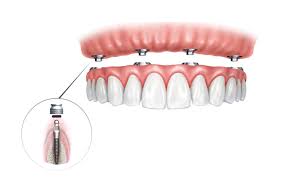Mini Dental Implants
Even if your dentures are fit to perfection, they may still wander or “float” now and then — especially your lower dentures. A floating lower denture can make it difficult to eat and embarrassing to talk. Fortunately, there is a denture stabilization system that can fix the problem: mini dental implants (aka MDI dental implants).
Dentists started using MDI dental implants as a dental stabilization system in the 1970s, but they weren’t considered “permanent” implant devices by the FDA until 1999. Since then, mini dental implants have become a favorite solution of patients and dentists for stabililzing a floating lower denture.
Like traditional dental implants, MDI dental implants are rooted into your jaw bone through oral surgery and act as a retaining fixture. But there are several differences: Mini dental implants are used for the lower jaw bone exclusively, usually to secure a lower denture but sometimes to support a dental crown. MDI dental implants are also smaller than traditional dental implants and, in most cases, can be placed in just one visit. Best of all, MDI implants can be 60-70 percent less expensive than traditional dental implants!
Mini Posts, Big Benefits
MDI dental implants aren’t called “mini” for nothing: They are just 1.8mm wide and available in four different lengths or 1.6mm wide and available in three lengths. Some dentists compare them to the size of a standard wooden toothpick. Your dentist or oral surgeon determines what size of MDI dental implants to use based on the amount and density of jaw bone available to secure them.
The thought of MDI implants being screwed into your jaw sounds worse than it actually is. The procedure is minimally invasive and generally takes just 1.5 hours to complete. In many cases, MDI dental implants can be inserted into the lower jaw without having to make an incision. More often than not, the only anesthesia that’s required is an injection over the area where the implant will be placed.
Unlike traditional dental implants, which can take 3-6 months to integrate, MDI dental implants allow for “immediate loading” (translation: you can use your lower denture just as soon as you leave the dentist’s office). And if you’re worried about post-op pain, you’ll be relieved to hear that many patients have said that there was little to no post-operative discomfort following a mini dental implants procedure.
Potential Snags
Your dentist or oral surgeon is the only professional who’s qualified to determine whether implant dentistry is right for you. In general, if enough dense jaw bone exists to support MDI implants, you could be a good candidate for them. But it’s important to note that some health conditions may preclude you from receiving mini dental implants and others may cause complications: Uncontrolled diabetes, compromised immune systems and substance abuse may prevent you from receiving mini dental implants, while Sjorgren’s syndrome and Alzheimer’s may cause complications or even failure. Habits such as smoking, drinking and bruxism can also complicate matters. During your initial consultation, it’s important to disclose all of your health information before committing to MDI dental implants.

